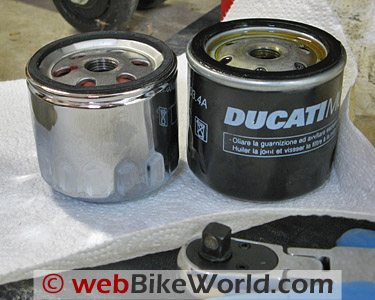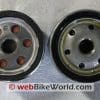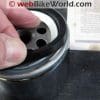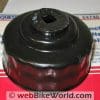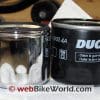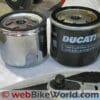Editor’s Note: Most of the information you’ll need to change the oil and filter on a Ducati Multistrada can be found in my Ducati Oil and Filter Change article.
After a year or so of ownership, I had changed the oil and filter on the Multistrada 620 only twice. It was changed once during the 600-mile service by a local repair shop and I wrote a short entry in my Multistrada 620 Blog about that experience.
According to my logs, I changed it again in May of 2008, using a Ducati oil filter and Motul V300 15W-30 synthetic oil.
So I decided to change it once more before winter 2008 sets in. The Multistrada is the default winter bike around here because it’s easy to ride, it’s wired for Tourmaster Synergy heated clothing (review) and its vestigial fairing and Ducati hand guards (review) help to keep at least some of the cold breezes off the rider’s hands and chest.
I don’t remember changing the Multistrada’s oil and filter back in May — in fact, I’m pretty sure that I simply drained the oil and re-filled it, without changing the filter. I’m not sure why I didn’t write that up for the blog, so I’ll now try and make amends.
But over the past year, more than one Ducati owner has written to tell us about substitute Ducati oil filters made by Amsoil. Some owners rave about them, although how it’s possible to really tell a good oil filter from a better oil filter is beyond me.
I’ve always been one to go by the book — or the owner’s manual, in this case — rather than try to second-guess the motorcycle manufacturer’s engineers on which oil to use.
And the Ducati manual is actually more liberal than most when it comes to oil recommendations, so my feeling is that if the oil is changed at regular intervals, just about any decent oil that meets the specs will work fine. After all, when’s the last time you heard of a motorcycle or car engine failing due to poor oil quality?
The same goes for oil filters. Who can second guess the engineers? The Ducati oil filter looks pretty rugged — if looks mean anything. And since the bike is still under warranty, I figured it’s best to use an official Ducati part rather than a substitute.
But, in the interest of science, we ordered a gaggle of Ducati substitute oil filters from Amsoil. Oil filters (and oil) can be ordered directly from the Amsoil website, by the way.
Amsoil recommends Ducati substitute oil filter part number EaO138C (or EAOM138C as it’s printed on the invoice, I believe that’s an “O” rather than a “0” [zero]).
Apparently, Amsoil must have some sort of relationship with Wix, because Wix filters are also sold on the Amsoil site, and, as it turns out, the Amsoil and Wix Ducati oil filters look nearly identical (see Owner Comments and Feedback from AMSOIL Below).
But first, a little background on the Amsoil motorcycle filters. Their Ea filters are, they claim, “made with full synthetic nanofiber technology”, although I’m not sure if the term “synthetic nanofiber” makes a lot of sense, or if the word “nanofiber” is a realistic word. Whatever — the marketing department strikes again…
Amsoil claims the filters are “Guaranteed for 25,000 miles or one year when used in conjunction with AMSOIL motor oil in normal service”, and this may be, but I can’t think of any reasonable motorcycle owner who’d let their bike go that long between filter changes, and who would you blame if things went wrong?
The current retail price as of this writing for the Amsoil EAOM138C Ducati oil filter substitute is a whopping $16.90, plus shipping, handling and possible sales tax. We bought four filters and the shipping was $7.50 and state sales tax was also added in.
We placed our order several months ago, and the filters were either on sale back then or the price has gone up, because we paid $15.10 for the Amsoil filter. They only had two Amsoil EAOM138C filters in stock when we placed the order, so we also ordered two Wix 557013 Ducati substitute filters. Wix filters can also be ordered directly from the Amsoil website, again an indication of some sort of corporate relationship.
The marketing info for the Wix 557013 is slightly less provocative, saying only that the filter is “Made with a full metal base plate for superior strength at the double seal & also feature a silicone anti-drainback valve. Glass-enhanced media in WIX oil filters offers greater efficiency, capturing more 10 to 12 micron sized particles than other cellulose/synthetic blend medias.”
Both oil filters look similar, but not identical, and both the Wix and Amsoil substitute oil filters also look different from the Ducati filter. In fact, they look so different that I was reluctant to use either one, and I went back to the Amsoil website to check once more to make sure I had the correct part numbers.
Here’s a chart I put together, illustrating the differences:
| Oil Filter | Dia. (Flats) | # of Flats | Height (mm) | Height (in.) | Cost |
| Ducati 444.4.003.4A | 74 mm | 8 | 67.75 | 2.670 | $15.95 |
| Amsoil EAOM138C | 71 mm | 16 | 65.85 | 2.593 | $16.90 |
| Wix 557013 | 74 mm | 14 | 61.10 | 2.400 | $11.60 |
As you can see in the next photo, there is what I think is a significant difference in the height of the Ducati oil filter compared to the Amsoil and Wix filters. But, it’s hard to tell what’s inside of the filter body, so this may or may not be meaningful.
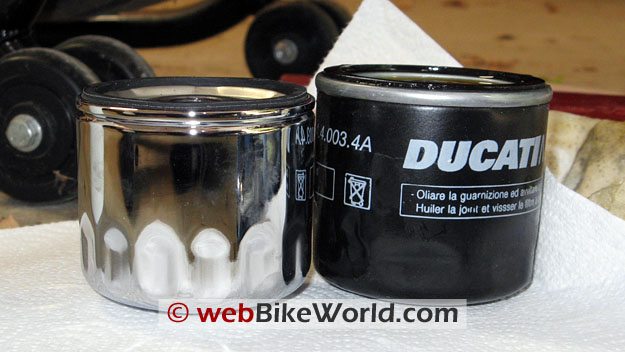
Comparing another feature, the business end of the oil filters also look significantly different. Here’s a photo comparing the Amsoil EAOM138C (left) with the Ducati 444.4.003.4A oil filter (right):
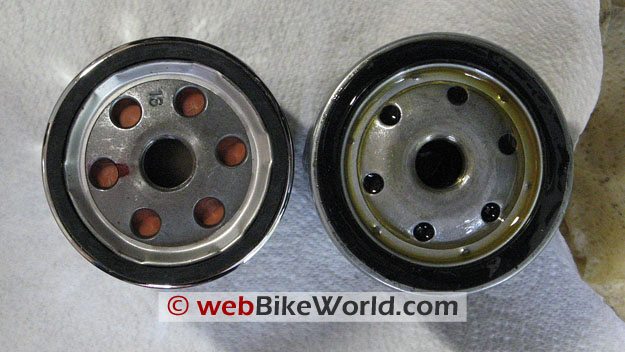
You can see that the oil intake holes in the Amsoil oil filter are larger in diameter, and the silicone anti-drainback valve (brown color in holes) is clearly visible. It’s possible that the oil in the used Ducati oil filter on the right is blocking the view to the anti-drainback valve; I don’t have a new Ducati oil filter to compare.
Both the Amsoil and Wix oil filters came with a chrome finish, which I could certainly do without, but no harm I guess, because 90% of the filter body is buried under and inside the Desmo L-twin anyway, so no one will ever know you have a chrome plate oil filter.
The Amsoil EAOM138C is on the left, with its 16 flats, or flutes more like in this case. The Wix 557013 is on the right; it has 14 flats on the body, a strange number:
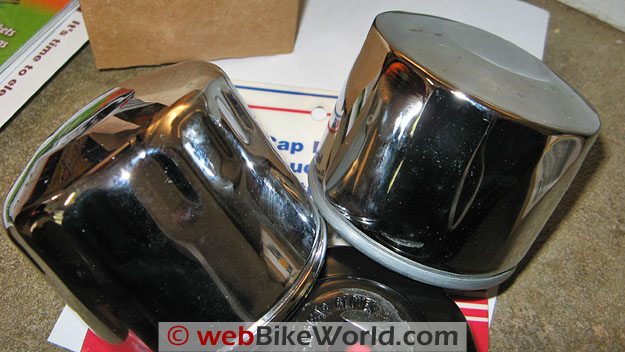
So now I had to find yet another oil filter cap wrench to fit the Amsoil filter. You think they could standardize on these things? Nah…
I discussed the Ducati oil filter wrench issue and the octagonal Vector 17030 oil filter cap wrench that fits the standard Ducati 74 mm oil filter in my previous Ducati Oil and Filter Change article. See that article for a lot more details on this project.
So I had a Vector 17030 to fit the Ducati branded oil filter, but it doesn’t fit the Amsoil or Wix filters — I didn’t realize both them would be that much different than the Ducati filter.
Rummaging around in the toolbox, I found a Vector 17000, and it fits the Wix 557013, so I’m all set with that one. I believe the Vector 17000 is 76 mm across, but it seems to have enough grip to work on the Wix 557013.
The 16-flute Amsoil EAOM138C is a different story. I now have 8 cap-style oil filter cup wrenches, and a handful of strap wrenches of different diameters, but wouldn’t you know it — nothing to fit the Amsoil filter.
So down I went to the local auto parts store and the clerk — an old-timer who probably forgot more about auto parts than most people know — found me a CarQuest STL 54740, with a dual 74 mm and 76 mm hex end.
This two-for-one wrench is also marked and sold as a Lisle 54740 “End Cap Filter Wrench”, again with the dual 74 mm and 76mm end (here’s the hot tip: you can get just about any type of oil wrench available at the Tool Warehouse).
The CarQuest 54740 has 15 flutes, which seems to fit the Amsoil EAOM138C, but not the Ducati or Wix filters. It cost me $6.31, and I should have bought the nice Sunex End Cap Oil Filter kit, which costs about $30.00 and includes 5 different cap wrenches, some with dual fitments, and comes in a molded case.
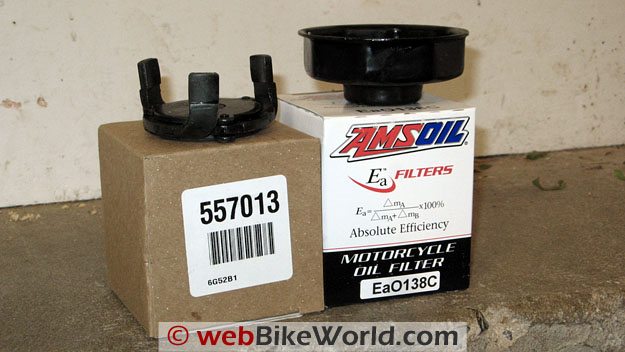
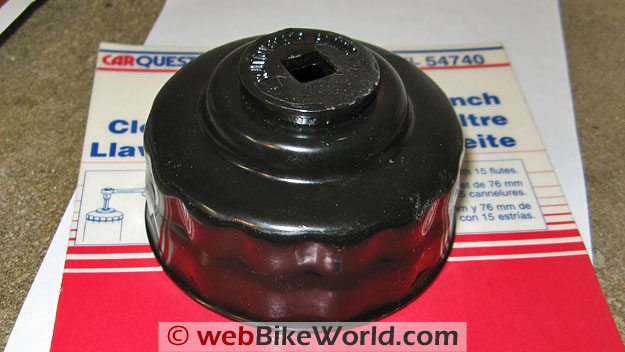
Replacing the Multistrada Oil Filter
OK, I won’t go into all the gory details about draining the oil on the Multistrada, because I covered that in my “master” Ducati oil and filter change article. Suffice it to say that it’s very easy to do, especially if the bike is held by something like the Acebikes Steady Stand front wheel chock.
So I’ll pick up at the point of threading on the new oil filter:
As I mentioned above, I was a bit anxious about putting what looked like a quite different filter back on the bike, but in the interest of science, I forged ahead.
I chose the Amsoil filter to try first, for no particular reason. It threaded on to the 620 cc Multistrada engine with no problems, but the 11 Nm of torque suggested in the MTS shop manual seemed excessive and the filter seemed like it wouldn’t stop turning. I was able to get it up to 10 Nm with the torque wrench and left it at that.
But then I realized that I forgot to first fill the Amsoil filter with oil — an important part of the job to help avoid, as much as possible, starting the engine with low oil pressure.
So I unscrewed the Amsoil filter again and — lucky for me — I realized that the rubber gasket was missing. It was stuck up inside the engine.
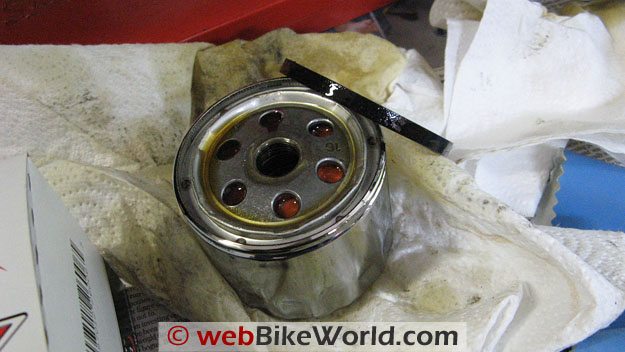
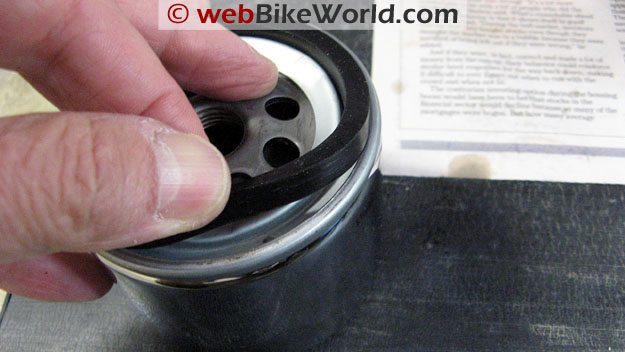
I was able to retrieve it, and this brings up an important point. This happened to me once before recently, when changing the oil in a car.
I didn’t realize the rubber gasket could come off the filter — any filter (not just the Amsoil). The gaskets are usually only placed on the filter base, not sealed on, and if the old gasket is left inside the engine’s oil filter receptacle, when the new oil filter is put back in the it will not seal correctly.
Anyway, I didn’t notice that the old gasket was left inside when I changed the oil in the car, and I put a new filter on top of it. When I started the car after refilling the oil, a huge amount of said oil come flying out, all over the driveway. Lesson learned, but then forgotten…
The usual cause of a stuck gasket is not oiling the gasket before putting the new filter in place. Always oil that gasket!
I didn’t want to take a chance on the Amsoil filter at this point, so I tossed it — $17.00 down the drain. Just for kicks, I checked the gasket on both the Amsoil and Wix filters and it comes right out of the base when I pick it with my fingernail — same with the Ducati oil filter gasket. So the lesson here is, be careful and double-check to make sure those gaskets are in place and oiled!
I tried again, this time, I used the Wix filter. It also screws up into the engine with no problems, and it seemed to seat more securely than the Amsoil filter, but I still don’t think it feels as secure as the Ducati filter, although I may now be over-sensitive to it based on my gasket experience with the Amsoil filter.
After everything was secured, I poured in the 3 liters (the MTS 620 takes 3.1 liters of oil) of Motul V300 and I was all set. I started it up and everything seems fine, but I’m going to keep an eye on it over the next few hundred miles just to make sure.
Conclusion
So that’s my story — I think in the end, I’d just as soon sleep easy at night knowing that I’m using the official Ducati oil filter.
So the next time I’m at the local Ducati shop, I’m going to buy a half-dozen or so of the standard Ducati version. It just doesn’t make sense to try and save a few bucks (which I didn’t, especially when you figure in the cost of the new oil filter cap wrench) and then have to worry that the filter is going to blow.
But, our pain is your gain, and that’s why I’m reporting my results back to you.
If you have any feedback or comments on changing the oil on your Multistrada, please send it to me at the address below.
Owner Comments and Feedback
See details on submitting comments.
From Richard Holappa, Jr., Technical Product Manager: Filtration/Aftermarket, AMSOIL INC.
“I had an opportunity to review your article regarding the AMSOIL EaOM138C for Ducati applications and wanted to respond to your comments.
AMSOIL has had a long history of providing world class lubricants and filtration products for motorcycle and other power sports applications.
AMSOIL utilizes the same oil filter media in our motorcycle oil filters as employed in AMSOIL full flow filters for automobile/light truck applications. AMSOIL nanofiber media have more pores per square inch, allowing for higher dirt-holding capacity and lower pressure drop compared to cellulose or cellulose/synthetic blend filter medias.
The thinner nanofiber media fibers also produce more uniform pore size distribution, improving the filter’s overall ability to capture and retain particles. According to ISO 4548-12 testing protocol, AMSOIL EaOM filters provide a filtering efficiency of 98.7 percent at 15 microns, outperforming the best cellulose/synthetic blend media on the market.
To the best of our knowledge, AMSOIL is the only company that communicates filtering efficiency on the filter or box in these applications. By cutting the AMSOIL filter open and comparing to the other filters in the market one can see the media (and component) differences.
In addition, Ea Motorcycle Oil Filters feature a silicone anti-drain back valve and a nitrile sealing gasket. The anti-drain back valve provides excellent protection during startup and remains flexible in all temperatures, while the nitrile sealing gasket resists chemical breakdown, providing excellent durability and ensuring long filter life.
After the chroming the EaOM138C, the sealing gasket is flipped to expose only the black rubber portion of the sealing material, thus making the filter more aesthetically pleasing. The gasket is simply placed in the base plate channel and pressed in by hand. The sealing characteristics of the filter are not compromised in any way.
In response to your comments pertaining to fact the EaOM138C looks very much like the WIX filter; AMSOIL works closely with a number of leading worldwide filter companies such as Donaldson, WIX, and MANN+HUMMEL, plus other partners to provide our Dealers and customers the most current filter technology and performance. All filter components, ranging from the media pack to the by-pass valve, are approved by AMSOIL and come from a variety of sources, not just one filter company.
Finally, AMSOIL does not use the same filter can as the OE Ducati filter, thus requiring a different wrenches for removal, (AMSOIL Part Number G2198) . AMSOIL also provides the appropriate end cap wrench for installation and removal, part number G2309.
Please do not hesitate to contact me if you have additional questions.”


